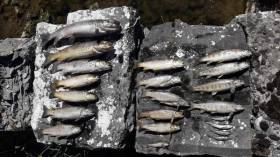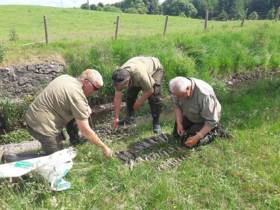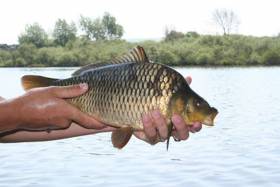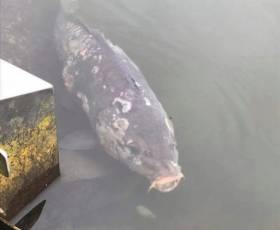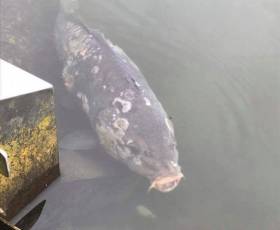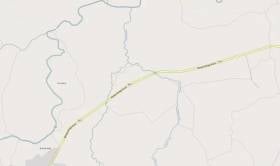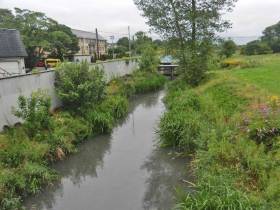Displaying items by tag: fish kill
Large Fish Kill in Tributary of Nenagh River is Confirmed by Inland Fisheries Ireland
Inland Fisheries Ireland has confirmed that a large fill kill occurred on the Ollatrim River, a tributary of the Nenagh River, Co. Tipperary last week. Fisheries Officers attended the site at Ballinahemery Bridge near Ballymackey, Nenagh, Co. Tipperary on Monday, 9th July 2018 after receiving a report.
In total, 14,749 fish were estimated dead with dead fish observed over a five kilometre stretch of the river. The species affected included brown trout (1,400), lamprey (10,500), Stoneloach (805), Minnow (1,820), Salmon (70), Crayfish (70) and Stickleback (84).
Inland Fisheries Ireland immediately commenced an investigation following the discovery of the fish mortality. Indications are that the fish kill occurred on Sunday (8th July) and locals have reported observing one or two dead fish on Saturday evening. This is the largest fish kill of Lamprey, a protected species, in recent years and it is anticipated that recovery will take several years.
The investigation to identify the source of the fish kill is continuing this week. The cause appears to have been a chemical agent, possibly a herbicide or pesticide, which has now passed through the system.
Inland Fisheries Ireland is reminding the public and the farming community that if they are using spraying equipment to be aware that these herbicide and pesticide chemicals, even when diluted with water, are liable to be extremely toxic to all aquatic species and fish in particular. Any mixing must be done far from natural watercourses, especially in the current conditions when diluting waters are in short supply, therefore, increasing the toxicity of the chemical.
If mixing chemicals, washing or using spraying equipment for any purpose, particular care must be taken to ensure that the rinsing of equipment does not take place near any water body or watercourse including small drains. Any washing must be carried out in a manner that will not pollute the waters.
Inland Fisheries Ireland has a confidential hotline number to enable members of the public to report incidents by telephone 1890 34 74 24 or 1890 FISH 24. The phone line is designed to encourage the reporting of incidents of illegal fishing, water pollution and invasive species.
On the evening of Wednesday, 6th June officers of Inland Fisheries Ireland received a report from a member of the public in Claremorris, Co Mayo regarding a fish kill on the Ballygowan River (one of the prime spawning tributaries of the Robe River), which flows into Lough Mask.
Investigations are still ongoing. However, it is believed that the fish kill was the result of 'effluent of agricultural origin' although the precise source has not as yet been identified. Local reports noted fish, primarily wild brown trout, in an agitated state in the river on Tuesday evening 5th June.
The stream where the mortalities occurred currently shows no sign of enrichment, and it is therefore probable that some polluting matter of a transient nature passed through the river and has since dissipated downstream.
Regretfully, over a thousand wild brown trout from 0-4 years old have been removed dead from the river. Other fish mortalities included stone loach and crayfish.
Given the extent of the damage to the river it will take some years for this stretch affected to make a full recovery.
Greg Forde, Head of Operations at Inland Fisheries Ireland, said: “Currently, water levels are at an all-time low and water temperatures are getting very high for trout and salmon. These factors combined can mean that a small amount of polluting matter can have devastating results. Inland Fisheries Ireland is calling on all farmers and silage contractors, in particular, to be extremely careful in the current conditions to ensure that no effluent is released near drains, streams and rivers, and silage clamps are properly bunded. Extreme care should be taken when spreading slurry to avoid all water courses in order to protect our valuable natural rivers and streams.”
The attached photos show just a proportion of the fish recovered by officers of Inland Fisheries Ireland following the fish kill.
Water samples have been taken for analysis and investigations are ongoing.
IFI is also asking the public to help protect and conserve the fisheries resource by reporting incidents or suspicions of illegal fishing to its confidential hotline number telephone 1890 34 74 24 or 1890 FISH 24.
DNA Testing Continues To Confirm Cause Of Cork Carp Kill
#Angling - Scientists at the Marine Institute’s Fish Health Unit are conducting further testing on sample carp from The Lough and Belvelly in Cork after the recent outbreak of suspected carp edema virus.
The tests include sequencing of the viral DNA to confirm its identity, and until confirmed the current findings shall be regarded as preliminary, according to a statement from the Marine Institute.
Molecular tests for Koi Herpesvirus Disease (KHV), a listed disease under European Fish Health legislation, were negative for all fish sampled. Additional molecular tests for cyprinid herpesvirus (other than KHV) were also in progress as of yesterday, Thursday 17 May.
The gills and skin of the sampled fish revealed an extremely high infestation of trichodinid parasites along with a fungal infection. White spots on the scales were also microscopically examined but there was no evidence of Ichthyophthirius multifilius infection.
Virological screening for Spring Viraemia of Carp is still ongoing with no virus observed to date. Bacteriological tests have revealed no growth of bacteria.
“While we’ve identified the presence of CEV — known to cause koi sleepy disease — in all the samples tested to date at the Marine Institute, we are still carrying out further tests for confirmation of the cause of the carp mortalities at The Lough and Belvelly lake,” said Dr Neil Ruane from the Fish Health Unit.
Dr Jeff Fisher, director of marine environment and food safety service at the Marine Institute, added: “Though the ultimate cause of the introduction of the disease agent into the loughs cannot be determined from current information, the loss of significant numbers of carp in these two lakes highlights the need for vigilance among anglers and other recreational users of Irish waters in the cleaning of their equipment and gear thoroughly after use, and also for the need for fishery owners and members of the public to be aware of the potential risk of transferring fish that may carry disease into the wild, and to never release ornamental fish into lakes or rivers.
“We’re continuing to work closely with Inland Fisheries Ireland and Cork City Council, and the Cork Carp Anglers Club to determine the cause of this fish kill, contain the incident, and identify appropriate biosecurity measures for the future.”
More than 750 carp were lost in the outbreak at The Lough in Cork city centre earlier this month, with the Cork Carp Anglers Club estimating the cost of replacing even a fraction of this number at €200,000 or more.
€200K To Restock Cork City Carp After Virus Outbreak
#Angling - The cost of replacing lost carp at The Lough in Cork city centre could be more than €200,000, according to the Irish Examiner.
Inland Fisheries Ireland responded to reports of a fish kill at the popular catch-and-release coarse angling venue on Friday 4 May.
Sample fish examined by scientists at the Marine Institute tested positive for carp edema virus, or CEV, which causes ‘koi sleepy disease’.
It’s since emerged that more than 750 carp were lost in the outbreak at The Lough, which hundreds more removed from the private Belvelly fishery near Cobh.
However, according to the Cork Carp Anglers Club, restocking cannot happen before issues with biosecurity and water quack are dealt with.
The Irish Examiner has more on the story HERE.
Cork City Fish Kill: Carp Test Positive For Edema Virus
#Angling - Scientists of the Fish Health Unit at the Marine Institute have advised that sample carp taken from The Lough and Belvelly Lake in Cork have tested positive for carp edema virus, or CEV.
The poxvirus causes a disease known as ‘koi sleepy disease’ in both koi and common carp.
The fish kill was first reported at The Lough in Cork city centre last week, with subsequent reports at Belvelly Lake in Cobh. Some 450 carp were removed from the former, and over 20 from the latter, as well as live samples from both for analysis.
At present, while tests are ongoing and further tests are carried out on the CEV detected, this is being treated as a ‘suspect positive’ and is not confirmed as the causative agent of the mortalities until all tests have been completed.
Inland Fisheries Ireland (IFI) recommends that stringent biosecurity protocols continue to be implemented. All mortalities continue to be removed and disposed of in a bio-secure manner.
Angling remains suspended at both locations, as well as at Inniscarra and Carrigadrohid Reservoirs.
#Angling - Inland Fisheries Ireland yesterday (Friday 4 May) responded to reports of a fish kill at The Lough in Cork city centre.
The reports were received from Cork Carp Anglers Club who recorded a number of dead fish at this iconic Cork carp fishery.
Initial investigations by IFI indicate the cause of death to be a fish health issue, with a bacterial or fungal infection suspected of causing the mortalities.
It is estimated that in the region of 200 carp have been infected in this outbreak.
A small number of live fish have been securely transported to a specialist fish health unit to identify the infectious agent.
All dead fish that have been collected are being held in cold storage at an IFI facility pending the outcome of tests to determine the exact cause of death.
Anglers are requested to suspend all fishing activity at the lake until further notice.
Any anglers who have been fishing the venue in the last month are advised to carry out appropriate disinfection of their landing nets, fish mats, footwear and other gear that may have become contaminated, to prevent the spread of the disease to other fisheries.
Irish Water Prosecuted Over Lime Discharge & Fish Kill In River Varty
#FishKill - Irish Water pleaded guilty to the discharge of deleterious matter to the River Vartry one year ago, at a sitting of Bray District Court this past Tuesday (20 February).
The offence related to the accidental discharge of lime from their water treatment facility at Roundwood, Co Wicklow.
Roisin O’Callaghan, fisheries environmental officer with Inland Fisheries Ireland (IFI), told Judge Kennedy that, on 21 February 2017, IFI received a call that there had been an accidental spill of lime at the water treatment plant.
On investigation, O’Callaghan confirmed that the spill had resulted in a fish kill for approximately 500 metres downstream from the discharge.
A series of water samples were taken and analysis confirmed that the lime spill had altered the pH in the receiving water, resulting in the death of approximately 100 fish.
Irish Water co-operated fully with IFI’s investigation and initiated an immediate clean-up of the site.
Eoghan Cole BL, representing Irish Water, stated that following the clean-up, the Environmental Protection Agency had completed a dye survey on the drainage network to confirm that only clean surface water was discharging to the River Vartry.
Judge Kennedy commented on the significance of the River Vartry in supporting Atlantic salmon, sea trout, brown trout and lamprey.
Irish Water were fined €500 with costs and expenses amounting to €6,937.65.
Biogas Firm Fined Over Moyola Fish Kill
#FishKill - A bio-renewables plant has been fined £1,600 over a fish kill in an important salmon and trout angling catchment in Co Derry over a year ago, according to BBC News.
J&A Renewables was found to have allowed a slurry discharge into the Altagoan River, a tributary of the Moyola River, causing the death of a “significant” number of fish over a two-mile stretch in November 2016, as previously reported on Afloat.ie.
The company, which uses slurry and silage to make biogas for power generation, was also found to be operating its anaerobic digester without a proper waste management licence.
A fine of £1,600 plus compensation costs of £1,800 was handed down by Magherafelt Magistrates Court.
Rise In Fish Kills Recorded In EPA Water Quality Report Disappointing Says Fisheries Agency
#FishKill - Inland Fisheries Ireland (IFI) has expressed disappointment at the findings of the Environmental Protection Agency (EPA)’s water quality review.
According to the EPA report, published yesterday (Thursday 31 August), the total number of reported fish kills in 2013–2015 was 97 — an increase in fish kills compared to 2007–2009 and 2010–2012.
In several instances of fish kills, the exact cause was unknown and several influences may have played a part.
IFI has cautioned against singling out any particular sector for the standard in water quality across Ireland’s river basins and lakes, backing the EPA’s findings that “multiple factors” are at play.
“There were 31 separate fish kills across the country last year, but just eight of those were directly attributable to agricultural activities,” said IFI chief executive Dr Ciaran Byrne.
“Inland Fisheries Ireland is grateful to the farming community for their continued consideration and vigilance. Good farmyard management can help to prevent accidental runs of polluting substances and protect the local environment.”
In addition to the agricultural-related kills, two fish kills were as a result of municipal works and one by industrial works.
In four instances, the exact cause of the fish kill was difficult to ascertain while 16 incidents of fish kills were as a result of disease and natural causes.
IFI carried out over 22,000 environmental inspections in 2016 across industrial, forestry, engineering, water treatment, farmyards and wind farms sites to help identify any risks and prevent damage to the local aquatic habitat.
“From an ecological and angling tourism perspective, our rivers and lakes are vital national resources,” said Dr Byrne. “It is essential that we protect and conserve these assets and water quality has a significant impact on fisheries habitats and populations.”
Tolka Fish Kill Caused By Tyre Blocking Sewer
#FishKill - A car tyre blocking a sewer led to a major fish kill on the River Tolka in West Dublin this week.
According to TheJournal.ie, as many as 500 fish were killed over a 3km stretch of the waterway between Mulhuddart and Blanchardstown after the blockage caused a manhole cover to overflow into the river.
Local anglers reported the incident to Inland Fisheries Ireland on Tuesday evening (18 July), as RTÉ News reports.
Since then, local angling shop proprietor Derek Talbot has described it as an “absolute disaster” for West Dublin’s angling community.
The Tolka previously suffered an extensive fish kill almost exactly three years ago, affecting thousands of fish downstream from Finglas Road in Glasnevin.




























